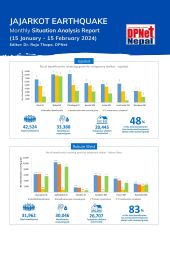Jajarkot Earthquake : Monthly Situation Report (15 Jan - 15 Feb 2024)
Summary
This report highlights the ongoing challenges and developments in the aftermath of the devastating Jajarkot earthquake. Initially, the Jajarkot Situation Report was published daily, then every four days until January 15, after which it shifted to a monthly publication schedule. Despite the government's decision to build temporary shelters to mitigate the severe winter conditions, over 27,000 families (37% of the total beneficiaries) continue to live under tarpaulins. With the arrival of warmer weather, there's optimism among the affected population about receiving grants for completing temporary shelters and eventually securing permanent housing. In Jajarkot, out of 42,524 survivors, 33,388 have received the first installment of grant support for temporary shelter construction making it 79 per cent grant disbursement to the identified beneficiaries until now. In this process, Bheri municipality has managed to build only 25.6 per cent shelters due to bureaucratic issues, absenteeism of homeowners living abroad, problem to identify beneficiaries and banking issues. Notable progress has been made in Nalgad Municipality with a 92 per cent shelter construction rate, while other areas like Barekot and Kushe Rural Municipality lag behind due to administrative and financial delays. Rukum West has shown better progress, with 31,962 families identified as eligible for shelter grants. Chaurjahari and Aathbishkot municipalities have made significant strides in fund disbursement and shelter construction. Overall, Rukum West has completed 83% of its temporary shelters, providing a tangible sense of recovery to the affected communities.
Despite these efforts, challenges remain with 27,334 families across both districts still living under tarpaulin. IRA report of damaged homes in Jajarkot and West Rukum revealed that 61,032 houses were either fully or partially damaged. However, the number of beneficiaries exceeded the total number of damaged houses to 74,486 due to the claim of separated living arrangements within households. The cold weather and snowfall have exacerbated the difficulties for those living in temporary shelters, causing health problems among the vulnerable populations. The Office of Industry and Consumer Protection in Jajarkot is preparing the workforce for infrastructure construction through training in earthquake-resistant techniques to address the skilled labor shortage. The NDRRMA is developing a comprehensive framework for post-earthquake reconstruction based on field studies and suggestions from affected people. Meanwhile, a Chinese official involved in relief efforts was deported for overstaying her visa and participating in a controversial altercation, raising questions about the conduct of foreign nationals in relief operations. In the annex section of thisreport, we have presented compiled versions of all previous situation analysis reports.
Categories:
DPNet Publication
Sub-Categories:
Situation Analysis Report
Published Year:
2024
